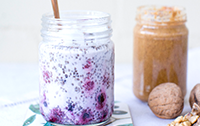
APEX Insights > Inspire > Seven top foods to enhance your mood*

September 2019
Seven top foods to enhance your mood*
If you’re looking to improve your mood, did you know that food may be a significant piece of the puzzle? The science behind food's effect on mood comes down to chemical and physiological changes in our brain structure which can lead to altered behaviour.
Some foods trigger food cravings and in the reverse, foods can trigger certain moods. Research suggests that good food can really put you in a buoyant mood. According to a study in the UK, ‘The Food and Mood Project’1, eighty percent of people who were surveyed reported a significant improvement in their mood when they were drinking more water and eating more ‘supporter foods’ such as vegetables, fruits, oily fish, nuts and seeds, brown whole grains, fibre, protein and organic foods. They also experienced less depression and anxiety.
The researchers also discovered that excess stressor foods such as refined sugar, caffeine and alcohol improved mood at first but then left people feeling stressed because they weren’t providing adequate nutrition and their bodies were left depleted.
This month I'm sharing my favourite mood foods that have been proven to alter your metabolism and brain chemistry, ultimately affecting your energy levels and the way that you feel.

Get Fishy
A study reveals Omega 3 fatty acids increase transmission of serotonin in the brain, which controls emotion2. Because of their ability to increase serotonin levels this makes fish and fish oils a very good mood food to include in your diet. Why not try this delicious Ginger Seared Tuna with Avocado and Smashed Peas.
You may not think of sardines as a happy food but these little guys are a great because they’re high in mood boosting omega-3 fatty acids3 and Vitamin B12 and include minerals such as calcium, iron, magnesium, potassium and zinc.4
Canned sardines are a convenient option, as they require minimum preparation and they’re not mercury heavy like tuna. You can add them to salads, or combine with lemon juice, olive oil, sea salt and pepper on a cracker for a tasty, nutritious snack. Try smashing some avocado and sardines on toast for your next brekky option whenever you feel like a boost. Or try this Smashed Sardines with Avocado on Chia and Flaxseed Loaf recipe.
If you’re not a fish fan you can swap out fish for flaxseed, chia, or extra virgin olive oil.

Go Nuts!
Did you know that Brazil nuts are the richest source of the mineral selenium, which helps combat depression?5
Studies have shown that a small handful of Brazil nuts everyday can help improve your emotional health.
A good way to enjoy them is as an on-the-go snack, or chopped and sprinkled over yogurt with grated dark chocolate. Pistachios are good for an instant pick-me-up because they are high in selenium. Enjoy a hit of happiness with these Pistachio Truffles.
Turn Your Frown Upside Down
Speaking of chocolate, there’s a reason why it can so easily turn a frown upside down. Cacao, the key ingredient in chocolate, is known to boost serotonin and dopamine levels to promote well-being.6 Cacao is rich in iron, magnesium, calcium and more.
Cacao gives us feelings of pleasure, happiness and lowers stress levels. The best way to enjoy cacao? Chocolate! Be sure to get chocolate that’s above 70% cacao or go for the delicious raw stuff! For a special occasion make this Raw Chocolate Tart with Berry Sauce.
Bananarama
The next happy ingredient on my shopping list is the humble banana; which contains a high dose of potassium, an essential ingredient for you to keep your nervous system in good shape and balanced. Eating a banana can also boost your dopamine levels; dopamine is a natural feel good chemical in the brain that plays a role in the pleasure and reward pathways.7
Some other ingredients that can boost your dopamine levels are foods like almonds, avocados and pumpkin seeds.
Get happy and get stuck into this easy to make Banana and Mango Smoothie.
Going Green
Broccoli is rich in B vitamin folate, which is essential for a healthy mood.9 Low intakes of the B vitamin folate has been linked to depression, and the great news is that Vitamin B also promotes healthy hair and skin, which boosts your self-confidence as your complexion glows. I like to steam broccoli and enjoy with white fish, or in a risotto. I also adore this mood boosting Oven Baked Broccoli and Cauliflower Steak recipe.

The mighty avocado!
This beautiful fruit (yes, I said fruit) is loaded with benefits to boost your mood, protect your heart and improve digestion. Avocadoes are natural hormone balances so they help us feel happy. Our body needs this healthy fat to help absorb various vitamins, particularly vitamin D.8
I love avocadoes on well… literally everything. Add it to your tacos, make a healthy dip or even top it on toast. So yes, next time you have to decide, say yes to the extra guac, or make this Mexican Taco Beef Stew with Guacamole

Purple Power
Blueberries can help prevent the release of cortisol, a hormone produced by the adrenal gland during stressful situations that travels to the hippocampus (a major portion of your brain) and provides emotional responses.
Berries can help control and counter the effects of this hormone’s impact on your mood.
Berries are loaded with anthocyanins, known to boost brain function10 and antioxidants, which promote brain and nervous system health. They’re also low in sugar and calories, so pile them on! Enjoy a boost of blueberries in this super Chia and Berry Overnight Breakfast Jar. It’s basically pudding for breakfast and the kind of breakfast you can make the night before and then wake up and reach for.
I hope you enjoyed this spirit-lifting list of foods. Here's to eating your way to a happy mood!
Gut health is important for your mental health and overall wellness, it’s one of the most important components of the body. We interact with it daily and it’s something intricately connected to many aspects of our everyday life.*
OnePath Life Limited (OnePath Life) is committed to deliver market leading mental health and wellness solutions with a focus on service, customer wellness and prevention. The focus on mental health and wellness is at the core to OnePath Life’s proposition. To deliver on our commitment, we have developed a suite of tools, education pieces, and collaborated with partners to provide our customers with the support they may need to facilitate a healthy life. OnePath Life has proudly partnered with Lee Holmes to provide education and nutritional inspiration for our customers to supercharge their health.
References
* Important note
The information related to your health is not intended to be a substitute for professional medical advice, diagnosis, or treatment. Always seek the advice of your physician or other qualified health provider with any questions you may have regarding a medical condition.
This material is intended for the use of financial advisers only and is distributed by OnePath Life Limited (OnePath Life) (ABN 33 009 657 176, AFSL 238341).
The information, opinions and conclusions in articles ("information") are current as at the date articles are written as specified within but are subject to change. The articles are provided and issued by OnePath Life unless another author is specified in the article, in which case it is provided and issued by that author. The views expressed are those of the authors only and do not necessarily reflect the opinions or views of OnePath Life, its employees or directors. Whilst care has been taken in preparing this material, OnePath Life and its related entities do not warrant or represent that the information is accurate or complete. To the extent permitted by law, OnePath Life and its related entities do not accept any responsibility or liability from the use of the information.
The information is of a general nature and has been prepared without taking into account a potential or existing investor’s objectives, financial situation or needs. Investors should consider whether the information is appropriate for them having regard to their objectives, financial situation or needs. For any product referred to above, OnePath Life recommends that investors read any relevant offer document or product disclosure statement and consider if the product is appropriate to them. For products issued by OnePath Life, these documents are available at access.onepathsuperinvest.com.au.
Past performance is not indicative of future performance and any case study shown is for illustrative purposes only. Neither are a prediction of the actual outcomes which will be achieved. Where tax or technical information is included, the information is our interpretation of the law and does not represent tax advice. An investor is advised to obtain professional advice relevant to their individual circumstances.